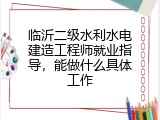临沂二级水利水电建造工程师工作内容
临沂作为山东省的重要地级市,其水利水电工程建设在区域经济发展和民生保障中占据关键地位。二级水利水电建造工程师是这一领域的中坚力量,他们不仅具备扎实的专业理论知识,还拥有丰富的实践经验和项目管理能力。其工作内容涵盖工程项目全周期管理,包括施工组织设计、技术方案制定、现场监督及质量控制等核心环节,确保工程符合国家规范和安全性要求。在就业层面,临沂地区的水利水电工程需求持续增长,为二级建造工程师提供了广阔的职场空间。他们可以在施工单位、监理机构、设计院所及政府监管部门等多类单位任职,从事具体的技术管理、工程咨询或政策执行工作。
除了这些以外呢,随着国家对水资源管理和乡村振兴战略的重视,这一职业群体在临沂的就业前景愈发乐观,既能参与大型水库、灌溉系统等传统项目,也能拓展至生态治理和新能源水电等新兴领域,实现个人职业发展与社会贡献的双重价值。
临沂二级水利水电建造工程师的角色定位与职业概述
临沂二级水利水电建造工程师是水利水电行业中的专业技术人员,持有国家颁发的二级建造师资格证书,专注于临沂地区的水利水电工程项目。这一角色在地方经济发展和基础设施建设中发挥着不可或缺的作用。临沂地处山东省南部,水资源丰富但分布不均,历史上多次洪涝和干旱问题凸显了水利工程的重要性。二级建造工程师在此背景下,承担着从项目策划到竣工验收的全过程管理职责,确保工程质量和进度符合标准。
他们的职业定位不仅限于技术执行,还涉及资源协调和风险控制。
例如,在临沂的沂沭河流域治理项目中,二级建造工程师需结合当地地理和气候条件,设计合理的施工方案,以应对季节性洪水挑战。
除了这些以外呢,这一职业要求具备较强的综合能力,包括法律法规知识(如《水利水电工程施工规范》)、工程技术应用以及团队沟通技巧。在就业市场上,二级建造工程师是临沂水利行业的稀缺人才,其职业前景与地方政策紧密相关。
随着山东省推动“十四五”水利发展规划,临沂加大了对中小型水库、灌溉系统和防洪工程的投资,为这一群体创造了更多就业机会。总体而言,临沂二级水利水电建造工程师不仅是工程项目的核心管理者,还是区域水资源可持续利用的推动者。
具体工作内容详解
临沂二级水利水电建造工程师的工作内容多元且具体,覆盖工程项目的各个阶段。
下面呢是其主要职责的详细分解,这些工作确保项目从概念到落地的顺利实施。
- 施工组织设计与计划制定:工程师负责编制详细的施工组织设计,包括工程进度安排、资源配置和施工方法选择。在临沂的典型项目,如小型水电站或灌溉渠道建设中,他们需根据当地地形和水文数据,优化施工流程,以提高效率并降低成本。
例如,在临沂山区的水利项目中,工程师可能设计分段施工方案,以规避雨季带来的风险。 - 技术方案审核与优化:他们审核设计图纸和技术文件,确保符合国家标准(如GB系列规范)和临沂地方要求。具体工作包括计算结构稳定性、校核水力参数,以及提出改进建议。
例如,在水库大坝工程中,工程师需验证混凝土配比和防渗措施,以防止渗漏问题。 - 施工现场管理与监督:工程师常驻工地, overseeing daily operations, such as material procurement, equipment deployment, and labor coordination. They ensure safety protocols are followed, addressing issues like slope stability in excavation or water quality control during construction. In Linyi, where projects often involve rural areas, this might include coordinating with local communities to minimize environmental impact.
- 质量控制与验收:他们实施质量检查程序,使用测试工具(如压力计或流速仪)监测工程指标,并准备验收文档。
例如,在临沂的防洪堤坝项目中,工程师需进行阶段性测试,确保堤坝高度和强度达标,最终参与政府部门的竣工验收。 - 成本控制与预算管理:工程师参与项目 budgeting and cost tracking, analyzing expenses related to materials, labor, and machinery. They might use software tools to forecast costs and avoid overruns, which is crucial in Linyi's publicly funded projects where efficiency is prioritized.
- 文档管理与报告编写:他们维护工程记录,包括施工日志、变更 orders and compliance reports, ensuring transparency and accountability. This documentation is vital for audits and future maintenance, especially in Linyi's water conservancy projects that involve long-term operations.
通过这些具体工作,临沂二级水利水电建造工程师确保工程项目高效、安全地完成, contributing to regional water security and economic development.
就业指导:行业需求与求职策略
临沂二级水利水电建造工程师的就业市场呈现稳定增长趋势,受地方政策和经济因素驱动。
下面呢是针对就业的详细指导,包括行业需求分析、求职策略和职业发展路径。
行业需求分析:临沂作为山东省的水利枢纽,其需求主要来自政府投资项目和私人 sector initiatives. According to local data, Linyi has over 100 ongoing water conservancy projects annually, ranging from reservoir reinforcements to rural water supply systems. This creates a steady demand for qualified engineers. Key employers include:
- 施工单位:如临沂水利工程公司或省级建筑企业,这些单位招聘工程师负责现场管理和技术执行。求职者应关注企业招聘公告,强调实践经验证书。
- 监理机构:工程师可在监理公司担任监督角色,确保工程符合规范。在临沂,这类职位往往要求熟悉地方标准,求职者需准备相关案例展示。
- 设计院所:例如临沂市水利设计院,工程师参与前期规划和设计工作。这适合那些擅长技术分析和创新的人,求职时应突出CAD或BIM软件技能。
- 政府部門:如临沂市水务局,职位涉及政策执行和项目审批。这类就业需通过公务员考试或事业单位招聘,要求较强的法律法规知识。
求职策略:成功就业需要结合资质提升和市场调研。工程师应保持证书有效性,通过继续教育更新知识,例如学习生态水利或智能监控技术。 networking through industry associations in Linyi, such as the Shandong Water Conservancy Society, can provide job leads. Additionally, tailoring resumes to highlight project experience in Linyi-specific contexts (e.g., flood control or irrigation) increases competitiveness. For fresh graduates, internships at local firms offer a foot in the door.
职业发展路径:从初级工程师到项目经理,路径包括积累项目经验后考取一级建造师证书,或转向咨询和培训 roles. In Linyi, with the rise of green water projects, engineers can specialize in sustainable design, enhancing long-term career prospects. Overall, the employment outlook is positive, with an estimated 10% annual growth in job openings due to Linyi's infrastructure expansion.
能做什么具体工作:实际应用案例
临沂二级水利水电建造工程师的实际工作涉及多个具体领域,以下通过真实案例说明他们的应用场景和贡献。这些案例基于临沂地区典型项目,展示工程师如何解决实际问题。
案例一:水库除险加固工程:在临沂的某中型水库项目中,工程师负责除险加固工作。具体任务包括评估坝体稳定性、设计加固方案(如采用土石方回填或混凝土衬砌),并监督施工。他们使用地质雷达检测裂缝,协调团队在旱季施工以避免洪水干扰。最终,项目提升了水库蓄水能力,保障了下游农田灌溉, demonstrating how engineers directly contribute to water resource management.
案例二:农村灌溉系统建设:针对临沂农业区的需求,工程师参与设计和建造智能灌溉系统。他们计算水流需求、布局管道网络,并安装自动化控制器。在工作中,他们需与农民沟通,优化系统以适应当地 crops like wheat or corn. This not only improves water efficiency but also supports Linyi's food security goals, showing the social impact of their work.
案例三:防洪堤坝项目:在沂河流域,工程师领导防洪堤坝的修建。具体工作包括水文分析确定堤坝高度、选择环保材料减少生态影响,并实施实时监控系统。 during flood season, they coordinate emergency responses, such as sandbagging or diversion channels. This case highlights their role in disaster prevention, protecting Linyi's urban and rural areas.
案例四:小型水电站运维:在临沂山区,工程师管理小水电站的建设和运维。他们设计 turbine installations, maintain electrical systems, and ensure compliance with energy policies. For example, in a recent project, they integrated solar-water hybrid systems to enhance reliability, illustrating innovation in renewable energy applications.
通过这些案例,可见临沂二级水利水电建造工程师的工作不仅技术性强,还具有实践多样性, directly addressing local challenges like water scarcity and climate resilience.
技能要求与持续学习
为了胜任上述工作,临沂二级水利水电建造工程师需要具备全面的技能集,并 engage in continuous learning to keep pace with industry advancements.以下是关键技能要求和学习建议。
核心技能:
- 技术技能: proficiency in hydraulic calculation, structural design, and construction methods. Engineers must master software like AutoCAD for drafting and SAP2000 for analysis, as well as field tools for surveying and testing.
- 管理能力: project management skills, including scheduling with tools like Microsoft Project, cost control, and risk assessment. In Linyi, where projects often involve multiple stakeholders, ability to lead teams and resolve conflicts is essential.
- 法律法规知识: familiarity with national standards (e.g., 《水利水电工程验收规程》) and local regulations in Linyi, such as environmental protection laws, to ensure compliance and avoid legal issues.
- 沟通与协调: strong interpersonal skills to liaise with government agencies, contractors, and local communities. For instance, in rural projects, engineers need to explain technical details to non-experts and gain community support.
持续学习途径:行业技术不断演进,工程师应通过以下方式更新知识:参加培训课程(如山东省水利厅举办的 workshops on new materials or techniques)、考取高级证书(如一级建造师或安全工程师)、阅读行业期刊(如《水利水电技术》),以及参与线上论坛交流经验。在临沂,本地 universities like Linyi University offer part-time programs in water engineering, providing accessible learning opportunities. Emphasis on emerging trends, such as digital twin technology for project simulation or green building practices, will future-proof careers. By investing in lifelong learning, engineers can enhance their competitiveness and contribute more effectively to Linyi's development.
挑战与应对策略
临沂二级水利水电建造工程师在工作中面临诸多挑战,从环境约束到资源 limitations, but effective strategies can mitigate these issues.本节探讨常见挑战及应对方法。
挑战一:环境与地理 constraints:临沂多山地形和季节性气候(如夏季暴雨) often delay projects and increase risks. Engineers address this by conducting thorough site surveys before construction, using GIS technology to map terrain, and developing contingency plans. For example, in flood-prone areas, they might schedule critical work during dry seasons and implement temporary drainage systems.
挑战二:资源与预算限制: Public projects in Linyi may have tight budgets, leading to material shortages or labor issues. Engineers employ value engineering to optimize resources, such as selecting cost-effective materials or adopting prefabrication techniques to reduce waste. They also leverage government subsidies or public-private partnerships to secure funding.
挑战三:技术更新与合规压力: Rapid advancements in technology require constant adaptation, while regulatory changes demand strict compliance. Engineers stay ahead by attending industry seminars and collaborating with research institutions. In Linyi, joining local professional groups helps share best practices and stay updated on policy shifts.
挑战四:社区与环境影响: Projects in populated areas face opposition due to noise or ecological concerns. Engineers engage in proactive communication, holding public hearings to address grievances and incorporating eco-friendly designs, such as using native plants for erosion control. This builds trust and ensures smoother project execution.
通过 these strategies,临沂二级水利水电建造工程师不仅能克服挑战,还能提升项目成功率, reinforcing their indispensable role in the region's growth.
未来趋势与职业展望
展望未来,临沂二级水利水电建造工程师的职业前景将受宏观趋势 shaping, offering new opportunities and evolving demands.以下分析未来5-10年的趋势和展望。
趋势一:智能化和数字化:随着智慧水利的兴起,临沂 projects are incorporating IoT sensors for real-time monitoring and AI for data analysis. Engineers will need skills in digital tools, such as BIM for 3D modeling, to manage smart water grids or automated irrigation systems. This trend will create roles in tech-driven project management, enhancing efficiency and sustainability.
趋势二:绿色与可持续发展:国家“双碳”目标推动水利工程向 eco-friendly方向转型。在临沂,这意味着更多生态修复项目,如湿地恢复或雨水回收系统。工程师可专注于绿色技术,如低影响开发(LID)设计,从而拓展就业领域。
趋势三:区域政策驱动:临沂的“乡村振兴”战略加大了对农村水利的投资,预计将新增大量中小型项目。工程师可能会看到更多机会 in rural development, requiring adaptability to work in diverse settings. Additionally, government initiatives like the Yellow River Basin protection plan will spur demand for experts in cross-regional projects.
职业展望: overall, the job market for Linyi's secondary hydraulic engineers is poised for growth, with potential annual salary increases of 5-8% due to high demand. Engineers who embrace continuous learning and specialization can advance to senior roles, such as project directors or consultants, contributing to Linyi's status as a hydro-engineering hub in Shandong. By aligning with these trends, they can ensure long-term career resilience and impact.
临沂二级水利水电建造工程师的工作内容深远而具体,就业指导需结合地方特色与个人发展。通过扎实的技能和战略规划,他们将在临沂的水利事业中持续发挥关键作用。
